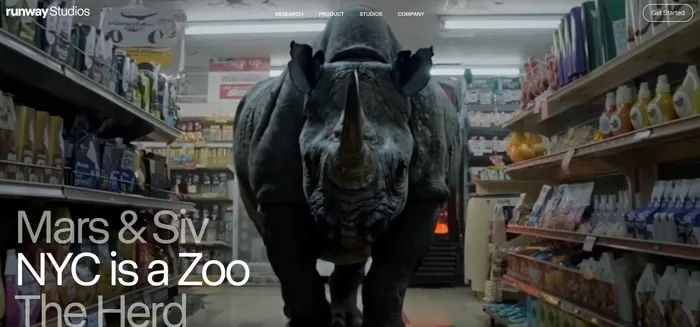
.
Image: Runway AI
In a move that could reshape the future of filmmaking, Netflix is quietly experimenting with generative AI video tools from New York–based startup Runway.
According to Bloomberg, the streaming giant is testing the software in its content production pipeline.
Netflix has declined to comment on the development.
Disney, too, has been in discussions with Runway and is exploring the potential of its tools, although a spokesperson for the company confirmed that it has no immediate plans to adopt the technology for production use. Runway also declined to comment.
The involvement of two of Hollywood’s most powerful studios underscores a larger shift: AI is no longer a distant threat; it’s becoming part of the toolkit.
Yet the technology remains deeply divisive across the entertainment industry, where concerns over job displacement and intellectual property rights run high.
The 2023 Writers Guild of America strike highlighted this issue and was a major factor in the breakdown between the union and major studio networks.
The Guild of America secured groundbreaking regulation prohibiting studios from using AI to exploit writers' material to train AI models, according to Vox.com.
The main aim was to prohibit digital recreations that utilise AI to reduce writers or their pay.
Runway, best known for igniting an AI video arms race in early 2023 with its Gen-1 and Gen-2 models, has evolved rapidly.
Its latest tech, Gen-4 and the new Act-Two system, can generate realistic special effects, simulate camera movements, and even perform motion capture without a green screen, all from simple video inputs or text prompts.
Despite Hollywood’s public wariness, Disney recently sued AI image startup Midjourney over copyright concerns. AI is beginning to creep into production workflows.
In Netflix’s case, co-CEO Ted Sarandos confirmed during the company’s Q2 earnings call that AI is already helping speed up special effects shots.
He cited the Argentine series El Eternaut, where AI was used to create a building collapse scene, though sources say Runway’s tools weren’t used for that particular effect.
Runway, however, is quickly gaining traction. The company recently inked a deal with Lionsgate to train AI models on the studio’s content, a move that signals growing interest in fine-tuned, studio-specific AI systems.
To date, Runway has raised $545 million, including a $308 million round this year, which values the company at over $3 billion.
The race to own the future of AI-generated video is heating up. OpenAI, Google, and a cadre of smaller startups are all vying for dominance in this fast-growing space.
OpenAI’s Sora tool, which can create complex video from text prompts, has made waves among filmmakers, but the company has yet to secure a marquee content deal.
Runway's edge lies in its early Hollywood traction and the practical application of its tools. The company’s Act-Two model, released this month, aims to democratise animation by simplifying motion capture, a task traditionally reserved for big-budget productions.
By combining affordability with creative power, Runway may be positioning itself as a disruptive force in visual storytelling.
